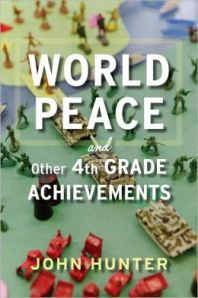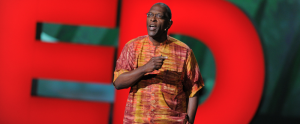If you would have asked teacher and musician John Hunter what would become of his initial concept of the “World Peace Game” 30 years ago, he probably would have shrugged and offered a hearty laugh. He would admit that he wasn’t quite sure but that the unknown itself was half the excitement because inherent to that potential empty space lay a realm of possibility and creativity.
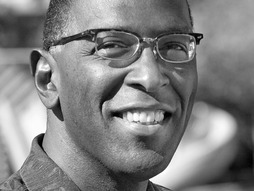 Fast-forward to the present day: John Hunter has been lauded for his innovative educational methodologies; honored as the top TED-talker of 2011; received the GlobArt Award in 2012; and his World Peace Game is the subject of the aptly named documentary, World Peace Game & Other Fourth Grade Achievements.
Fast-forward to the present day: John Hunter has been lauded for his innovative educational methodologies; honored as the top TED-talker of 2011; received the GlobArt Award in 2012; and his World Peace Game is the subject of the aptly named documentary, World Peace Game & Other Fourth Grade Achievements.
John Hunter’s reflection on the developing role of the schoolteacher in communicating the lessons of a more peaceful world gives pause for global professionals, regardless of field, to think about how educators can effectively use hands-on learning simulations to enhance a child’s understanding of collaboration, analysis, the rigors of decision-making, and heightened communication skills.
In interviewing John Hunter, it becomes vividly clear that this man’s teachings and philosophies have profoundly transformed his students. After playing the World Peace Game, they deeply understand the increasingly complex political and social conditions around the globe, and learn together that only through systemic, cooperative effort can harmony or peaceful aims be achieved.
Interview with John Hunter about the World Peace Game:
Lauren: Thank you for joining us today, John. You’re just getting back from an extensive travel journey. How was that for you?
John: Since 2010, it’s just been a whirlwind and the film, World Peace & Other Fourth Grade Achievements, has just kind of scooped us up and carried us off! I just got back from a short break this year and am getting ready to head back out for our multi-city tour and then abroad once again.
Lauren: What kind of response have you been receiving for your book, World Peace & Other Fourth Grade Achievements?
John: We have received overwhelmingly positive response and some of the more touching ones have been from military personnel. We had a soldier write in just the other day, saying he was brought to tears during the section of the book where the children have to write a letter home to the parents of troops lost in battle. It’s a moment about consequences of war and loss, and the solider said that he greatly appreciates the exercise because he himself had to talk to the parents of children lost in war, and believes the kids can learn the consequences of drastic action and become a little wiser about their future actions– they learn to value life, no matter what ‘side’ it’s on.
Lauren: Have many military personnel responded similarly to that soldier’s reaction?
John: Actually, yes, quite a few have. There was one that was a member of a PTSD group, and he and his fellows in the group are great supporters of our work. He wrote sort of a fan letter which greatly touched me.
Of course, we had our experience being invited to spend time with the Defense Secretary, Leo Panetta, and the Head of the Joint Chief of Staff, Martin Dempsey, at the Pentagon. I think the General spent half a day with my 9-year-olds discussing politics. The students had lived through it in a simulative way, but they could talk together about theory and insurgencies with the staff; the students were accorded a lot of respect by those who know what they were talking about.
The military connection has been surprising; the fondest thing that I could remember is when I came off stage at the TED Talks in 2011, and a huge fan rushed up to me and grabbed me in a big bear hug. He was a soldier who had just come back from Afghanistan and coined me. He gave me a huge honor by giving me this coin, and was crying in response to the same topic (of the letter) in the TED Talk. The military have a sort of Peace Wing at the Pentagon and are embracing our message.
Lauren: Do you feel like adults who become familiar with the game take away different lessons or problem solving capabilities than the children do?
John: Well, so far we’ve only played the game with adults once- with an international group composed of Finns, Norwegians, Brits, Czechs, Bosnians, and one American. Overall, the adults had a much more difficult and much more sophisticated game that they play. They bring much more to the game, additional baggage and experiences that children don’t have. It was very intense as we had to breakthrough more of an emotional moment between the international players, and then the adults began to produce a great collaborative effort that helped them win the game. The children always let me know– they tell me how something has effected them in their lives when it happens, which is an incredible feeling for a teacher to have. The adults and children stay in touch with each other once the experience is done– it’s incredibly touching how the players become somewhat of a family.
Lauren: Have you ever had a moment where you learned through someone very unexpected and what did you learn?
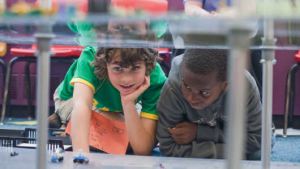 John: Well, you hit on something deeply important in the game. Every moment is a teaching moment and everyone and anything is a teacher. The key is staying aware and attentive to the reality of the moment enough to catch it – and this is where the self-reflection comes in- and this requires an ability to practice focusing on being grounded in the present moment. That sharpness makes it possible to catch those moments; I talk about it in the book of course with the example of the two arms dealers boys who decided not to sell nuclear weapons because they had sold enough weapons. They realized that if they sold any more weapons, they would put themselves out of business.
John: Well, you hit on something deeply important in the game. Every moment is a teaching moment and everyone and anything is a teacher. The key is staying aware and attentive to the reality of the moment enough to catch it – and this is where the self-reflection comes in- and this requires an ability to practice focusing on being grounded in the present moment. That sharpness makes it possible to catch those moments; I talk about it in the book of course with the example of the two arms dealers boys who decided not to sell nuclear weapons because they had sold enough weapons. They realized that if they sold any more weapons, they would put themselves out of business.
What a double-edged sword but what innovative thinking that they discovered this amazing philosophic insight and critical thinking tool; the boys decided to support their customers and invested in poor populations to help the become stronger and wealthier, in order to them to turn around later on and purchase more weapons. Whether right or wrong, the depths of creative thinking they had to go to is incredible and you can’t step in with a “right answer” ahead of time because that impedes the natural process of learning.
Lauren: You speak a lot about the notion of the “Empty Space” – do you find that throughout the 30 years you have been teaching the game, your students seek out or find this space for themselves?
John: Yes, especially since the game is a huge equation and I’m asking them to grasp it all at once, which is almost impossible. The left-brain, the logical side, shuts down in overload and the right-side comes to life to grapple with the questions intuitively and creatively. My girls often do this; they sit back, for a while, and observe. Now in a traditional classroom, this level of ‘non-participation’ is not allowed and not considered to be good, but in the World Peace Game, it’s a practical and useful thing because it means that the students are taking it all in and letting part of the equation unfold before them.
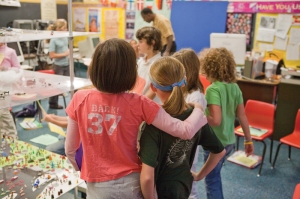 One instance of this was with a 10-year-old girl who played the part of Secretary of State for one of the nations. She had been sitting for almost half the game and not doing anything, so I went over to her because I thought she might be checking out. I asked how she was doing and she said, “I’m okay. I’m alright; I’m just thinking.” It turns out that around the second half of the game, she steps up and does this amazing Jedi feat on many different levels all at once and changes the game for the better! She had been developing her own way in silence, in stillness, that, as a teacher, I would have judged to be inactivity. She was working hard at a tremendously deep level. This is proof of self-evident assessment because we can all see and witness what this person develops and knows, and how they learn from reflection.
One instance of this was with a 10-year-old girl who played the part of Secretary of State for one of the nations. She had been sitting for almost half the game and not doing anything, so I went over to her because I thought she might be checking out. I asked how she was doing and she said, “I’m okay. I’m alright; I’m just thinking.” It turns out that around the second half of the game, she steps up and does this amazing Jedi feat on many different levels all at once and changes the game for the better! She had been developing her own way in silence, in stillness, that, as a teacher, I would have judged to be inactivity. She was working hard at a tremendously deep level. This is proof of self-evident assessment because we can all see and witness what this person develops and knows, and how they learn from reflection.
Lauren: Thank you again for taking the time to do this interview. I have one remaining question for you. In your book, you wrote: “I want to teach them what I believe is the ultimate point of education and everything else, which is simply to express compassion in this world.” Could you tell me a story of how you reached this moment and realization?
John: Sure, that is a beautiful question. Of course, it all starts with our parents and teachers who had such compassion for us. You really understand when you ruminate or reflect on it that someone has cared for you so much and helped you grow for years; somebody had to take such great care to keep you alive. That template, and the children showing me over the years of teaching the game that you need to take care of each other, combined to help me understand this belief. The children always decide to spontaneously take care of everybody– I don’t need to teach it or preach it– so I just watched their examples. There is always some student looking after the underdog or the weakling, and bringing this issue to the attention of the entire world (all the players). I put so many obstacles in front of them at the beginning of the game– ecological disasters, military crises, political problems, nuclear proliferation issues, territorial disputes, endangered species, religious tensions, and more; to put it bluntly, it’s a pretty devastating scenario, yet the children always discover that it’s good in some ways and focus on those threads.They take the time to take care of everything and give it all a sense of utmost importance, and it’s this deep level of compassion and understanding that drives them and helps them move together throughout the obstacles of the game and throughout life.
***
If you would like to find out more about John Hunter and the incredible stories of the children who played his World Peace Game, please visit The World Peace Game Foundation or support the work of John Hunter by purchasing his book, World Peace & Other Fourth Grade Achievements.




